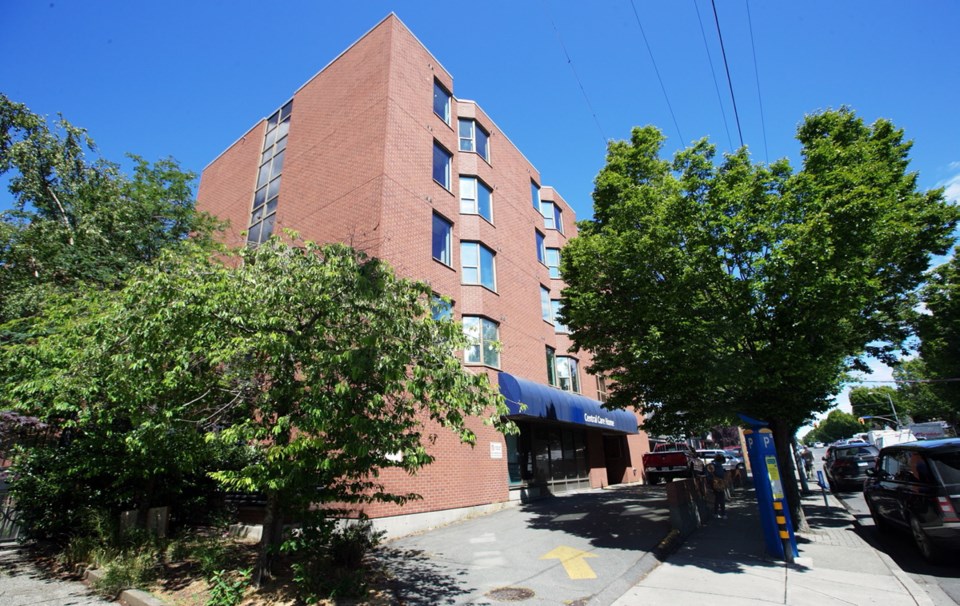Former tent city residents living at 844 Johnson St. say even with rules requiring guests to sign in and restricting overnight stays, the building is crowded with non-residents, including some surreptitiously subletting rooms.
Portland Hotel Society, which manages the supportive housing complex on behalf of B.C. Housing, is fighting an order by the Residential Tenancy Branch to stop prohibiting overnight guests and forcing guests to sign in with ID.
The decision comes after 11 tenants complained through the landlord-tenant dispute process that the guest policy is an invasion of privacy and discriminatory against low-income people.
One tenant said some residents will double up in rooms and then sublet their empty room to a friend who is on the street. Residents pay $375 a month in rent, the maximum shelter allowance for those on disability assistance.
She said residents prop open the back doors leading to Pandora Avenue so people can access the building through a stairwell.
“I walk out of my door and it’s like: ‘Who are these people hanging out in our hallway?’ That’s what I don’t like. They’re not visiting people, they’ve just come in off the street.”
She said some non-residents can be disrespectful of the building, citing an example of someone defecating in the showers because there is no public washroom.
The woman and several other residents who spoke with the Times Colonist on Wednesday disagree with the guest sign in policy, saying it’s a form of surveillance that makes people feel intimidated and belittled.
“It’s not like you’re visiting people in jail,” the woman said. “Are they snooping on us?”
She said residents know they’re responsible for their friends and that bad behaviour can get them evicted.
A former resident said the policy that guests be 19 years of age or older makes no sense since he claims there are a handful of teens as young as 16 living in the building.
At the building on Wednesday, front-desk staff were still asking guests to show drivers licences, passports and government-issued letters and cheques. A security guard was patrolling the block.
Staff were not authorized to speak about the guest policy or the issue of subletting. The Portland Hotel Society said in a statement the guest policy is in place to keep residents safe.
Victoria Coun. Geoff Young said council is aware that Victoria police are often called to the building with complaints about extortion, assault and intimidation, often perpetrated by non-residents with a criminal background. Young believes the guest policy should be kept in place.
“I don’t know that the police ever contemplated that rather than improving the sign-in policy and making it more rigid and enforcing it, the direction [from the Residential Tenancy Branch] would be to eliminate it entirely,” he said. “The facility would become a taxpayer-funded tent city if there were no rules with regard to who could arrive.”
The society would not comment on whether it is keeping the policy in place until after it appeals the Residential Tenancy Branch decision. An arbitrator decided the building is a residential property, not a home-based health facility and as such, the landlord must follow the Residential Tenancy Act.
The arbitrator said if there are any unruly or problematic guests, they can be banned on a case-by-case basis.
Jade Boyd, a researcher at the B.C. Centre on Substance Use, has published her findings on surveillance in supportive housing. After talking to people in Vancouver’s Downtown Eastside, she found that video cameras, coercion, police presence and staff surveillance negatively affected the everyday lives of low-income residents.
“Our research has demonstrated that restrictive guest policies prevent access to family and community, create isolation, and are at odds with respectful and dignified housing that low-income people need and deserve,” Boyd said in a statement.
“These kinds of policies should be avoided, and the health and social well-being of residents should be prioritized.”
The tent city on the courthouse lawn was shut down in August 2016 after the province invested more than $26 million to buy four buildings to provide supportive housing — the former Central Care home on Johnson Street, Mount Edwards Court seniors home on Vancouver Street and the Super 8 and Tally Ho hotels on Douglas Street.



